TUESDAY'S SCRIPT TIP:
DON'T QUIT YOUR DAY JOB!
So there’s a thing going around on social media about the worst job that you have ever had, and a list of five or ten jobs that you have had and one is false, plus an article on some website about how you have to be rich to be a writer... so if you are poor, you are going to fail and probably should just quit now... which lead me to write this new script tip about Day Jobs. Because whether you are looking at writing screenplays or writing novels and short stories you are probably going to have a day job when you start out... and maybe even a couple of times in between. One of the quote memes that I run on my twitter account is from Robert Benchley, a very famous writer from the 1930s and 1940s, who says: “The freelance writer is a man who is paid per piece or per word or perhaps.” Perhaps meaning perhaps not - often you do a lot of work and there is no payment. So you probably shouldn’t quit that day job, yet.
TAKE THIS JOB AND SHOVE IT!

All of us fantasize about quitting the day job and writing full time, and that’s a great fantasy... but often doesn’t work very well as a reality. There are people who save up a year or two’s salary and quit their day job with a make it or break it deadline for being a well paid professional writer when that money runs out. Here’s the problem - it will run out before you break in, and then what? The larger problem with this method is that people think that this will finally give them time enough to write... when they actually had the time all along. No tapping of ruby slippers required.
I have done both things. After I sold a screenplay to a company who had a deal with Paramount Pictures (I got script notes from the studio), I quit my day job working in a warehouse and moved to Los Angeles, got a nice-but-affordable apartment in Van Nuys (the center of the valley) and became a full time writer! I had two year’s worth of money in the bank, so no pressure! I could finally write! But I basically wrote about as much in those two years as a full tie screenwriter as I had in the ten previous years as a full time forklift jockey who wrote a page or more a day every day before work. I had all of this time, now, and I wasted most of it. You probably will, too.
The real reason why we can’t get any writing done doesn’t lay in our jobs, but in ourselves.
I always say that if you want to do something, you will do it... and if you don’t want to do something you won’t do it. Just that simple. If you want to write, you will write. You will find the way to do it. If you don’t want to write, you will find ways not to write. Whether you have ten minutes free a day before work, or whether you have all day to work - you will probably get close to the same amount of work done. At least, at first. If you are nit getting any writing done due to your day job, you will not get any writing done without the day job. So quitting your day job is probably a big mistake.
Here’s the problem: Not only will you probably not be writing any more than you wrote before, there will now be intense pressure on you to write something that sells... and that can kill your soul... and make you hate writing... and generally cause you to fail. You are not relaxed and having fun when you are writing... and it becomes work. Worse work than your day job, which you tolerated. Because you don’t love your day job like you love writing, so you can’t hate it with the same intensity. Your day job offered a “security blanket” and that allowed you to be relaxed and creative. No pressure to write, it was something that you looked forward to... something that you loved! And if you start to hate writing (because you NEED to write something that someone will buy, but you don’t seem able to) you will do less and less writing... and that will not pay your rent.
Soon you will be looking for a job, and finding only entry level positions that pay you less than the job that you quit and suck even more.
DAY JOBS

How I got those script notes on Paramount Pictures stationary was by writing a minimum of a page a day every day while working 40-48 hours at that day job. I looked forward to writing every morning before work... and while working the day job I was secretly thinking about the scene that I would be writing the next morning. Coming up with dialogue and actions and cool things - basically having it all written out in my mind (with some notes jotted on the file cards in my pocket or the tops of cardboard boxes - someone might get shipped a box missing a lid!) and that made that morning writing session smooth and fun and *productive*. I often wrote three pages a day instead of just one.
Though I optioned some scripts for real money ($5k, 10k) during that period, that wasn’t enough money to quit the day job. I worked for ten years at that job, writing 3 screenplays a year (plus a few novels and short stories), before I sold that screenplay to the company at Paramount. Factor that into your “3 Year Plan” or whatever you have. If I had quit my day job after getting that $5k option, I would just be scrambling to find another day job when that money ran out, because it was a couple of years before the $10k option. Neither of those deals went all the way to the screen - and the production bonus (the real money). And even now, lots of deals never get much farther than that - it’s just the way the business works. They have to have a lot of possible films in the pipeline in order to have one get all the way into production. You plant a lot of seeds and get one prize rose bush. So, back to Benchley, perhaps you get paid... but that doesn’t work for a 3 Year Plan or a 5 Year Plan - you can’t tell when it’s all going to come together and you are going to make a living at this. I know a writer with a bunch of credits... who still has his day job. It’s a well paying job, and he doesn’t want to quit it. He works part time, now, but with the option of going back full time if this screenwriting thing goes to hell.
My Day Job Theory is to find something that is a good job, that is different than writing. Something that will pay the bills, but you won’t think of as a career. Though I know some copywriters who became screenwriters, I think that has the possibility of backfiring. You may be so busy writing for the day job that when it comes time for you to write a screenplay or novel or short story, you want to do anything but write. You use up all of the creativity at the day job. I have always picked day jobs where creativity was not required, so that I would want to write when I had a spare hour or two. But maybe you are different - like I said, lots of people had writing oriented day jobs and became writers.
If you move to Los Angeles, you might think that working in the film business is a great way to make connections, and that’s a good thought. But you might also end up with a job that leaves little time for writing. If you are a set P.A. (Production assistant, a “go fer”) you will work 12 hour days probably six days a week... and do laundry and sleep on your day off. They pay isn’t good enough to take much time off, but maybe you will really need to write on those times between gigs? Other jobs in the business may take less time from your day, but may be exhausting in other ways. So choose your day job carefully - it’s what is paying your bills while you write. You want something that will actually pay the bills, but not burn you out so that you don’t want to write.
IT’S RESEARCH!

There's that old saying in the computer world: "Garbage in, garbage out". You only get out of it what you put into it. As writers, we need new experiences to keep us out of a writing rut.
Writers basically live in isolation. We spend all day long cursing our cursors in some room we've converted into an office. Our contact with the outside world is limited to family, and friends... and it doesn’t take long to learn everything about them and worry that the weird thing about your spouse that would make a great story would probably also lead to them divorcing you. The drawback of full time writing is that we can run out of experiences. People often ask me how I can write in coffee shops, and the answer is - when I look up from my laptop screen, I am looking out a window to the world. I get to see people that I wouldn’t see in my home office doing things that might even be interesting. Might even spark a story idea. But at the home office? It’s quiet, but too quiet.
As a full time writer, where do we see the outside world? Where do we come into contact with people with different opinions and lifestyles? Where do we find the experience which we transfer into plots for novels or short stories or screenplays?
PEOPLE, PLACES. THINGS?

John Steinbeck offered this advice to writers: "Ride the bus." Why? Because you come into contact with people you don't know. People who can spark plot ideas. Incidents which are unpredictable. Fuel for your stories. You don’t need to actually ride the bus, but you do need to get out into the world and interact with people who are much different than you are... and that’s one of the reasons why you probably shouldn’t quit your day job. It provides that window to the world.
Elmore Leonard is one of my favorite novelists. When you read his bio, you find out where he's learned so much about real people and real motivations. He's been a migrant farm worker, a union official, an autoworker, an ad man; and had a half dozen other jobs which have little to do with writing. Except experience. Interesting experiences. And you don’t need an interesting job to have those experiences.
I worked in a movie theater almost full time during High School, and then got a job at K-Mart, which was the first of the big box discount retailers. It was a terrible job, but I had moved out of my parent’s house after high school and needed enough money to pay the bills and pay for my short film making addiction. I was writing and making super 8mm films back then, and taking a Film Appreciation Class at Diablo Valley Community College while working full time at K-Mart. Because I had a good voice and was funny, they let me do the store’s closing announcement and the Blue Light Special announcements, so I was having some fun at a lousy job... But I was doing all kinds of research without even knowing it.
In every job I have ever had, I have been able to get to know people that came from very different backgrounds than I had and learn about their lives. How would I have ever become friends with all of these strangers that I have worked with over the years? There were great lessons in empathy in these jobs - which is a critical element in writing and probably every aspect of art. I came to understand people who very very different from me, people of different races, people of different sexual orientations, people who lead very different lives than mine. When you work side-by-side with people, in sometimes stressful situations, you come out of it appreciating people for just who they are. Your co-workers become your fiends and confidants and sometimes you live vicariously through them... and all of that is not just material for creating characters but allows you the ability to understand characters. Our narrow windows into the world expand by meeting all kinds of people who would never cross our paths if we hadn’t been hired to work at the same place. So a Day Job gives us all kinds of people research. Some of the folks that I have worked with over the years became characters in my screenplays, or aspects of their lives became the doorways into characters who were nothing like those real people - but had some element of their lives that wasn’t part of my live or experience.
ARE YOU EXPERIENCED?

Day Jobs have also given me experiences that I would never have had without them. From good to bad. Working at K-Mart, one of my co-workers from the department next door to mine was beaten with an umbrella by an old woman who thought the store was hiding the product that she was looking for in the back room. He was taken away from the store in an ambulance, she was taken away in handcuffs. He came back to work after a few weeks, but he was traumatized by angry customers and eventually quit. I don’t know what happened to the old woman - who was someone’s grandmother. I also don’t know what was going on in her life that caused her to snap like that - but I imagined some possibilities that would result in her losing it over such an insignificant thing. You get to see the good and bad in people when you are working retail. The screenplay that sold to Paramount was inspired by the time I worked Sporting Goods and sold guns... and ended up a witness in a couple of murder trials - customers who shot family members. Um, traumatic for me. But also, an experience I would never have had sitting in my room and writing all day. That scared me, and writing about it was therapy... and a script sale. Hey, not all experiences are good ones. Some of you may not be thinking this Day Job things is a good idea... but instead you should maybe think about being a little more picky about day jobs than I was back then.
The other thing that I got from day jobs was a particular set of skills... or maybe a peculiar set of skills. I have fork lift jousted... and that made it into a script. I have sold fine wine and been given the VIP tours of vineyards and been to wine tastings and once had a glass of wine that cost twice my weekly salary (just for one glass). That stuff made it into a script called “Rough Finish” that’s about a “private palate” who will break into a vineyard and taste wine before its time to advise connoisseurs whether it’s a good investment... and becomes the man who knows too much. I have learned how to do all sorts of things as part of a day job that I would never have learned how to do on my own. As a screenwriter, one of the things that I like is to research other people’s jobs... but when I started out I was using my own “accidental research” from my jobs.
WHEN YOU'RE A STRANGER

As writers we're required to know everything. In one of Lawrence Block's Matt Scudder novels, he has a scene where carpet is being installed. It was was not authentic. Though I don't think that carpet installers are a big enough demographic to matter much, it took me out of the story for a moment. If this had been a movie, I can imagine all of the carpet installers across the world saying WTF??? at the same time. I laid carpet for a year and can tell you the names of the tools, the nicknames of the tools, and how to use them. I can also tell you three hundred stories about going into stranger's homes and discovering the secrets they keep from the outside world. I've been in hundred of bedrooms and seen some strange things while installing carpets there. I don't think my carpet installing experience matters as much for authenticity in some scene like the one in the Scudder novel (who really cares?), as it does for the experience of going into stranger's homes and seeing aspects of their lives that are usually secret.
And I've met some unusual people, too. Folks that ended up becoming characters in screenplays. Like the henpecked husband who found out I wrote mysteries and asked, "If you were going to murder someone, and get away with it, how would you do it?" After I told him and left his house with my carpet scraps, I began wondering: What if he used my idea on his wife? Now there's a story.
So don’t look at a Day Job as something terrible that you have to do to pay the bills, that gets in the way of your writing. A day job can bring you into contact with interesting people and strange events and unusual pools of knowledge. You can have some job that pays the bills so that you are relaxed enough to write when you have the time, and be learning about people and skills that would never have been part of your life without that job.
Maybe even lead to writing a screenplay about Blue Light Specials at K-Mart?
BRAND NEW!
How Do I do That?

101 SCREENWRITING ANSWERS Blue Book!
New to screenwriting? You probably have questions! How do I get an Agent? How do I write a phone conversation? Do I need a Mentor? What’s does VO and OC and OS mean? What is proper screenplay format? Should I use a pen name? Do I need to movie to Hollywood? What’s the difference between a Producer and a Production Manager, and which should I sell my script to? How do I write a Text Message? Should I Copyright or WGA register my script? Can I Direct or Star? How do I write an Improvised scene? Overcoming Writer’s Block? How do I write a Sex Scene? And many many more! This book has the answers to the 101 Most Asked Questions from new screenwriters! Everything you need to know to begin writing your screenplay!
All of the answers you need to know, from a working professional screenwriter with 20 produced films and a new movie made for a major streaming service in 2023!
Only $4.99
NEWEST AND BLUEST!
Want To Look Like An Expert?

RESEARCH & WORLD BUILDING Blue Book!
Does this gun fire 6 shots or only 5? In all of the excitement of writing your action scene, you might not have done the research... and your hero could be out of ammo! Whether you are writing a novel or screenplay, you can save your hero, and your story, by doing a little research first! This book looks at Why you should research, Whether you should research First or Later, PLUS the importance of World Building in Science Fiction, Fantasy... and the worlds you explore in every other genre. Movies like JOHN WICK and THE GODFATHER take place in their own unique worlds... and writers must create them! YOU are the technical advisor on your Screenplay or Novel.
Using movie examples like TOP GUN, HUNT FOR RED OCTOBER, BLUE CRUSH, ADVENTURE LAND, several of my produced films, JOHN WICK, the novels of Donald E. Westlake and Thomas B. Dewey, SPY KIDS, the LORD OF THE RINGS movies, SOYLENT GREEN (which takes place in the far off future of 2022), and many others we will look at researching stories and creating worlds. The 8 Types Of Research, the 10 Types Of Information To Look For, 12 Important Elements Of World Building. Plus chapters on How To Rob A Bank and Commit Murder And Get Away With It for those of you interested in crime fiction, and Researching The Future for those writing science fiction, and Levels Of Reality if you are writing about a version of the real world.
No matter what you are writing, this book will help you find the facts... or make them up in a convincing way!
Only $4.99
NO KINDLE REQUIRED! Get the *free* app (any device, except your Mr. Coffee) on the order page on Amazon!
NEWISH!
Can You Make It bigger?

BLOCKBUSTERS (and BEACH READS) Blue Book!
Writing something EPIC?
ONLY: $4.99!
Thinking about writing a big Disaster Movie? An Historical Epic? An Epic Adventure Film? Or maybe you like Gladiator Movies? This book looks at writing Blockbusters and those Big Fat Beach Read novels - anything epic! Usng movies like JAWS, POSEIDON ADVENTURE, LAWRENCE OF ARABIA, THE GUNS OF NAVARONE, and those MARVEL and FAST & FURIOUS flicks as examples. What *is* a Blockbuster? 107 years of Blockbuster history! Blockbuster Characters. Blockbuster Story Types! Why modern Blockbusters are soap operas! Social Issues in Blcokbusters? Big Emotions! Keeping All Of Those Characters Distinctive! How to avoid the Big problems found in Big Movies and books! More! If you are writing a Big Event Movie or a Big Fat Novel, there are tips and techniques to help you!
Only $4.99
NEW in 2020!
Making Your Own Movie?
WRITE IT: FILM IT BOOK!

Making Your Own Movie?
Writing An Indie Film?
Writing A Low Budget Genre Script To Sell?
Writing A Made For TV Holiday Movie?
You will be writing for BUDGET. On a standard spec screenplay, you don’t have to think about budget, but these types of screenplays writing with budget in mind is critical!
If you are making your own movie, budget, is even more important - and you need to think about budget *before* you write your screenplay... or you will end up with a script that you can’t afford to make (or is a struggle to make). Everyone is making their own films these days, and even if you have done it before there are lots of great techniques in this book to get more money on screen - for less money! You can make a film that looks like it cost millions for pocket change.
344 Pages - ONLY: $7.99!
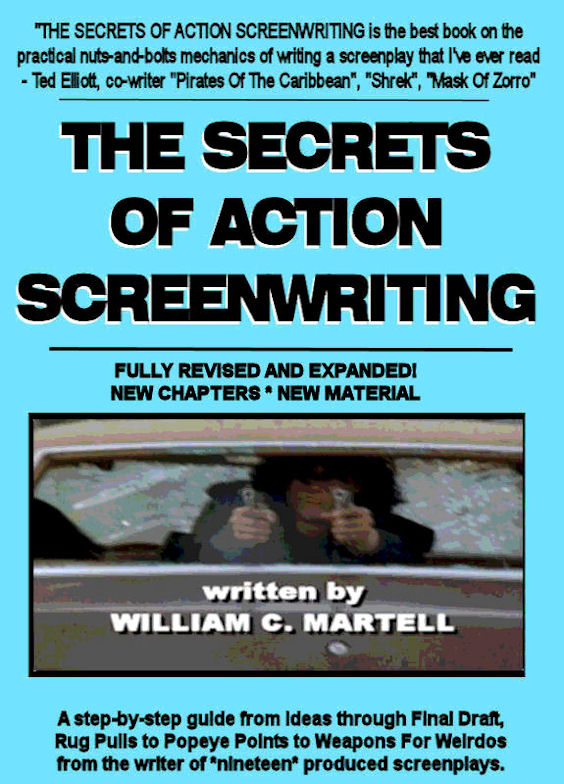
THE BOOK THAT STARTED IT ALL!
*** THE SECRETS OF ACTION SCREENWRITING *** - For Kindle!
*** THE SECRETS OF ACTION SCREENWRITING *** - For Nook!
Why pay $510 for a used version of the 240 page 2000 version that used to retail for $21.95? (check it out!) when
you can get the NEW EXPANDED VERSION - over 500 pages - for just $9.99? New chapters, New examples, New techniques!
"SECRETS OF ACTION SCREENWRITING is the
best book on the practical nuts-and-bolts mechanics of writing a screenplay I've ever read."
- Ted Elliott, co-writer of MASK OF ZORRO, SHREK, PIRATES OF THE CARIBBEAN and the sequels (with Terry Rossio). (ie; 4 of the top 20 Box Office Hits Of ALL TIME.)
Only $9.99 - and no postage!
NO KINDLE REQUIRED! Get the *free* app (any device, except your Mr. Coffee) on the order page on Amazon!
BRAND NEW!
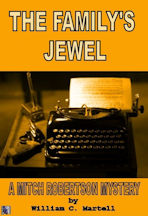
***
MITCH ROBERTSON #2: THE FAMILY'S JEWEL *** - For Kindle!
"The Presidential Suite of the Hollywood Hoover Hotel looked like a bloody battlefield: bodies everywhere, furniture broken, red liquid dripping from the walls, dead soldiers littering the elegant Berber rug as clouds of smoke overhead bounced between two air conditioning vents.
Mitch Robertson stepped over the body of an ex-child star turned sex tape star turned pop star and entered the room, spotted a gun on the floor and picked it up... careful not to spill his coffee with three pumps of mocha syrup from Penny’s Coffee Shop. That coffee was gold, the only thing keeping him going in this dazed state of wakefulness. The gun felt light. Holding it, he saw the silhouette of an 80s action star sitting sideways on a tipped over chair. Motionless. Was he dead? Mitch was still hung over from the Awards Party the night before, and wondered whether this was all some sort of crazy nightmare that he would wake up from... but when he tripped over the brown legs of a bottomless Superhero, flaccid junk encased in a condom but still wearing his mask, and hit the edge of the sofa, gun skittering and coffee spilling, he realized that it was all very real. What the hell had happened here?"
Short Novel. Only 99 cents! - and no postage!
ADVICE FROM 1920!
*** VINTAGE #1: HOW TO WRITE PHOTOPLAYS *** - For Kindle!
***
Screenwriting books have been around as long as films have. This series reprints vintage screenwriting books with a new introduction and history, plus new articles which look at how these lessons from almost 100 years ago apply to today’s screenplays. Anita Loos book is filled with information which still applies.
In addition to the full text of the original book, you get the full screenplay to Miss Loos' hit THE LOVE EXPERT, plus several new articles on the time period and women in Hollywood.
ONLY $2.99 - and no postage!
Tips FAQ

My New Script Secrets Newsletter!


STORY IN ACTION SERIES!

THE MISSION IMPOSSIBLE MOVIES
NEW: Updates On Films 7 & 8 Casting!
All Six Movies analyzed! All of the mission tapes, all of the “that’s impossible!” set pieces and stunts, the cons and capers - and how these scenes work, the twists and double crosses, the tension and suspense (and how to generate it), the concept of each film as a stand alone with a different director calling the shots (broken in the sixth film), the gadgets, the masks, the stories, the co-stars and team members (one team member has been in every film), the stunts Tom Cruise actually did (and the ones he didn’t), and so much more! Over 120,000 words of fun info!
THE MISSION IMPOSSIBLE MOVIES - 347 Pages - Only $3.99 !

BRAND NEW!
*** THE BOURNE MOVIES
NEW: Updates on TREADSTONE TV show!
All five "Bourne" movies (including "Legacy" and it's potential sequels) - what are the techniques used to keep the characters and scenes exciting and involving? Reinventing the thriller genre...
or following the "formula"? Five films - each with an interesting experiment! A detailed analysis of each
of the films, the way these thrillers work... as well as a complete list of box office and critical
statistics for each film. This book is great for writers, directors, and just fans of the series.
Only $3.99 - and no postage!
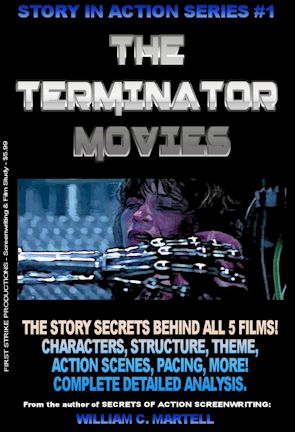
Over 240 pages!
*** THE TERMINATOR MOVIES *** - For Kindle!
He's back! The release of "Terminator: Dark Fate" is set to begin a new trilogy in
the Terminator story... 35 years after the first film was released. What draws us to these films about
a cybernetic organism from the future sent back in time? Why is there a new proposed trilogy every few
years? This book looks at all five Terminator movies from a story standpoint - what makes them work
(or not)? What are the techniques used to keep the characters and scenes exciting and involving? How
about those secret story details you may not have noticed? Containing a detailed analysis of each of
the five films so far, this book delves into the way these stories work... as well as a complete list of
box office and critical statistics for each film. This book is great for writers, directors, and just
fans of the series.
ONLY $3.99 - and no postage!
NO KINDLE REQUIRED! Get the *free* app (any device, except your Mr. Coffee) on the order page on Amazon!
HITCHCOCK FOR WRITERS!
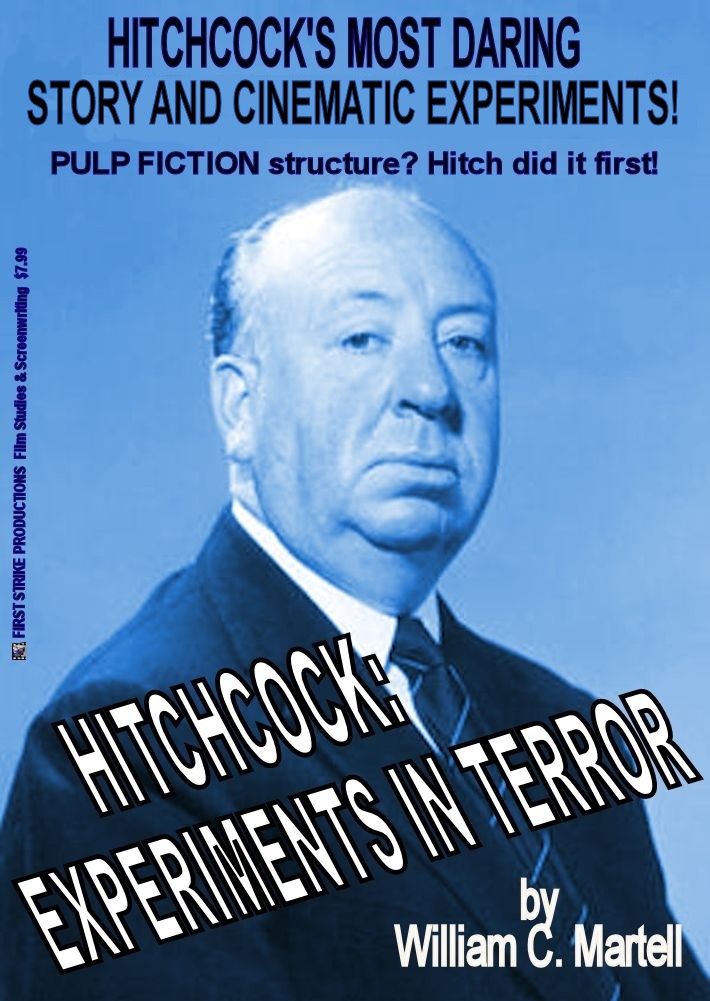
Strange Structures!
*** HITCHCOCK: EXPERIMENTS IN TERROR! *** - For Kindle!
***
Contained Thrillers like "Buried"? Serial Protagonists like "Place Beyond The Pines"? Multiple Connecting Stories like "Pulp Fiction"? Same Story Multiple Times like "Run, Lola, Run"?
HITCHCOCK DID IT FIRST!
This book focuses on 18 of Hitchcock's 52 films with wild cinema and story experiments which paved the way for modern films. Almost one hundred different experiments that you may think are recent cinema or story inventions... but some date back to Hitchcock's *silent* films! We'll examine these experiments and how they work. Great for film makers, screenwriters, film fans, producers and directors.
Only $5.99 - and no postage!
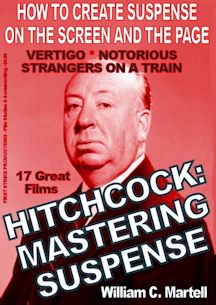
LEARN SUSPENSE FROM THE MASTER!
*** HITCHCOCK: MASTERING SUSPENSE *** - For Kindle!
Alfred Hitchcock, who directed 52 movies, was known as the *Master Of Suspense*; but what exactly is suspense and how can *we* master it? How does suspense work? How can *we* create “Hitchcockian” suspense scenes in our screenplays, novels, stories and films?
This book uses seventeen of Hitchcock’s films to show the difference between suspense and surprise, how to use “focus objects” to create suspense, the 20 iconic suspense scenes and situations, how plot twists work, using secrets for suspense, how to use Dread (the cousin of suspense) in horror stories, and dozens of other amazing storytelling lessons. From classics like “Strangers On A Train” and “The Birds” and “Vertigo” and “To Catch A Thief” to older films from the British period like “The 39 Steps” and “The Man Who Knew Too Much” to his hits from the silent era like “The Lodger” (about Jack The Ripper), we’ll look at all of the techniques to create suspense!
Only $5.99
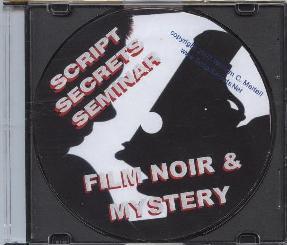
AUDIO CLASS!
NOIR & MYSTERY80 minute CD packed with information on writing Film Noir and Mystery scripts. Using examples from CHINATOWN to OUT OF THE PAST to DOUBLE INDEMNITY you'll learn how to create stories in this dark, twisted genre. How to plant clues, red herrings, suspects, victims, spider women, fallen heroes, the funhouse mirror world of noir supporting characters... and the origins of Film Noir in literature Noir dialogue and how noir endings are different than any other genre. All of the critical elements necessary to write in this critically popular genre.
The Noir & Mystery Class is only $15 (plus $5 S&H). First 20 on Limited Black Disk!
RECESSION SALE! $5 OFF!
IDEAS AND CREATIVITY - 80 minute CD packed with information. Tools to find ideas that are both personal *and* commercial. Hollywood wants scripts with High Concept stories... but not stupid scripts. Developing *intelligent* high concept ideas. How to turn your personal story into a blockbuster - or find your personal story in a high concept idea. Brainstorming and being creative. Ideas and Creativity is $10.00 (plus $5 S&H)
WRITING INDIES - Writing an Indie film? This class covers everything you need to know - from Central Locations to Confined Cameos. Using examples from SWINGERS, THE COOLER, STATION AGENT and others, this 80 minute CD is packed with information. How Indoe films challenge the audience (while mainstream films reassure the audience). Structures, using BOYS DON'T CRY, RUN LOLA RUN, HILARY & JACKIE, and others as example. Writing for a budget, writing for non-actors, getting the most production value out of your budget. Writing Indies is $10.00 (plus $5 S&H)
WRITING HORROR - The essentials of a horror screenplay - what do ROSEMARY'S BABY, NIGHT OF THE LIVING DEAD, THE EXORCIST, BRIDE OF FRANKENSTEIN, THE OTHERS and OPEN WATER have in common? This class will tell you! All of the critical elements necessary to write a script that scares the pants off the audience. Writing Horror is $10.00 (plus $5 S&H).
Click here for more information on CLASS CDs!
THE BLUE BOOKS!
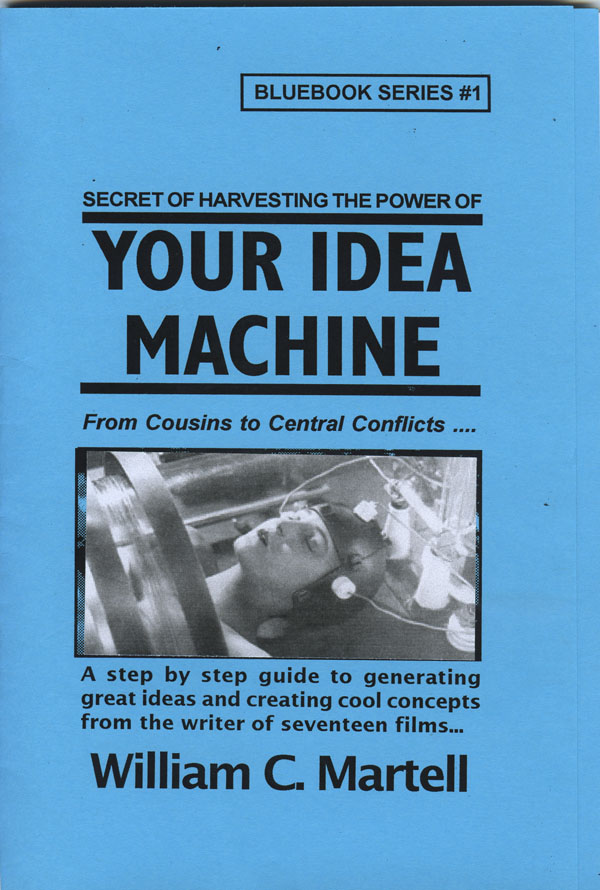
FIND A GREAT IDEA!
*** YOUR IDEA MACHINE *** - For Kindle!
****
Expanded version with more ways to find great ideas! Your screenplay is going to begin with an idea. There are good ideas and bad ideas and commercial ideas and personal ideas. But where do you find ideas in the first place? This handbook explores different methods for finding or generating ideas, and combining those ideas into concepts that sell. The Idea Bank, Fifteen Places To Find Ideas, Good Ideas And Bad Ideas, Ideas From Locations And Elements, Keeping Track Of Your Ideas, Idea Theft - What Can You Do? Weird Ways To Connect Ideas, Combing Ideas To Create Concepts, High Concepts - What Are They? Creating The Killer Concept, Substitution - Lion Tamers & Hitmen, Creating Blockbuster Concepts, Magnification And The Matrix, Conflict Within Concept, Concepts With Visual Conflict, Avoiding Episodic Concepts, much more! Print version is 48 pages, Kindle version is over 175 pages!
Only $4.99 - and no postage!
FIGURE OUT YOUR STORY!
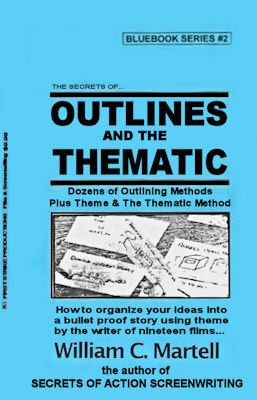
OUTLINES & THE THEMATIC Blue Book.
ARE YOUR SCENES IN THE RIGHT ORDER?
AND ARE THEY THE RIGHT SCENES?
Your story is like a road trip... but where are you going? What's the best route to get there? What are the best sights to see along the way? Just as you plan a vacation instead of just jump in the car and start driving, it's a good idea to plan your story. An artist does sketches before breaking out the oils, so why shouldn't a writer do the same? This Blue Book looks at various outlining methods used by professional screenwriters like Wesley Strick, Paul Schrader, John August, and others... as well as a guest chapter on novel outlines. Plus a whole section on the Thematic Method of generating scenes and characters and other elements that will be part of your outline. The three stages of writing are: Pre-writing, Writing, and Rewriting... this book looks at that first stage and how to use it to improve your screenplays and novels.
Only $4.99 - and no postage!
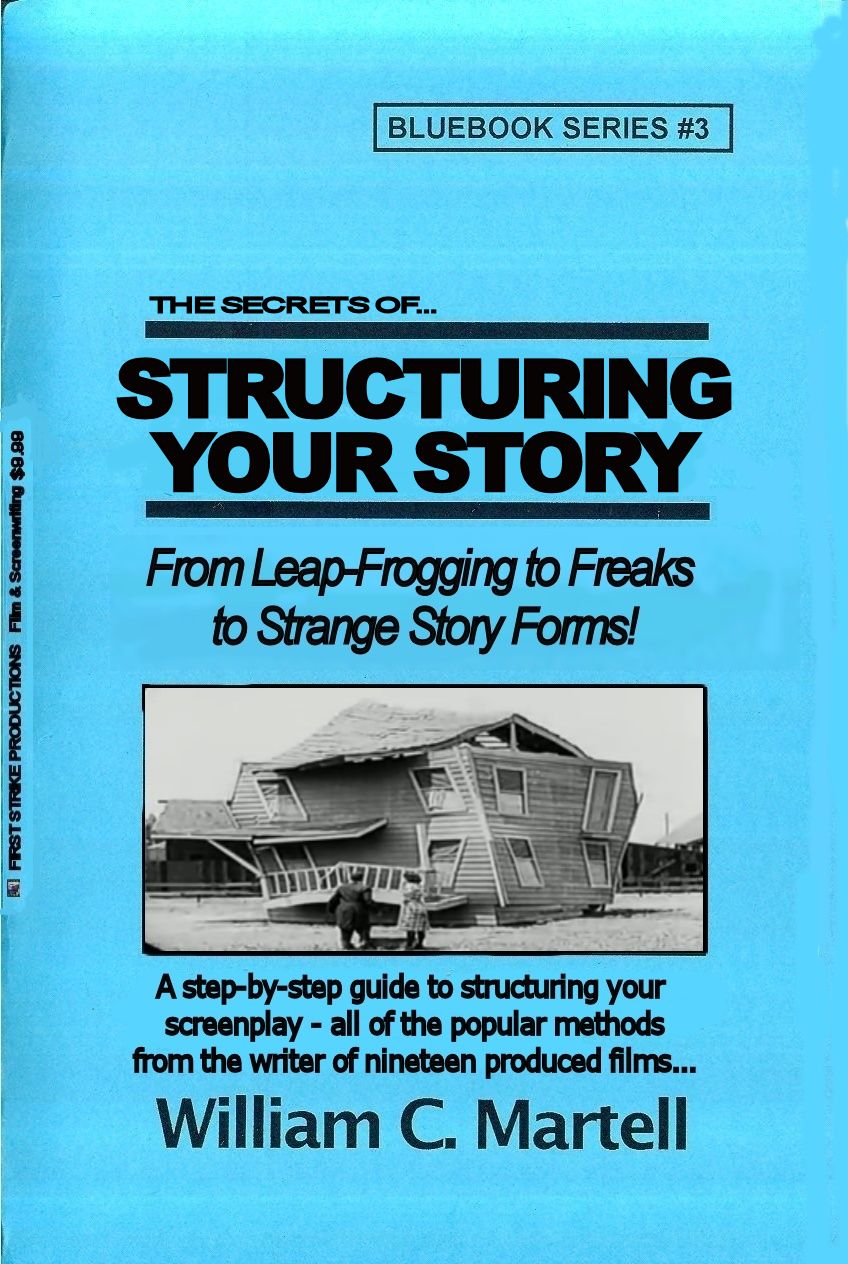
GOT STRUCTURE?!
*** STRUCTURING YOUR STORY *** - For Kindle!
William Goldman says the most important single element of any screenplay is structure. It’s the skeleton under the flesh and blood of your story. Without it, you have a spineless, formless, mess... a slug! How do you make sure your structure is strong enough to support your story? How do you prevent your story from becoming a slug? This Blue Book explores different types of popular structures from the basic three act structure to more obscure methods like leap-frogging. We also look at structure as a verb as well as a noun, and techniques for structuring your story for maximum emotional impact. Most of the other books just look at *structure* and ignore the art of *structuring* your story. Techniques to make your story a page turner... instead of a slug!
Only $4.99 - and no postage!

STORY: WELL TOLD!
*** STORY: WELL TOLD *** - For Kindle!
This book takes you step-by-step through the construction of a story... and how to tell a story well, why Story always starts with character... but ISN'T character, Breaking Your Story, Irony, Planting Information, Evolving Story, Leaving No Dramatic Stone Unturned, The Three Greek Unities, The Importance Of Stakes, The Thematic Method, and how to create personal stories with blockbuster potential. Ready to tell a story?
Print version was 48 pages, Kindle version is over 85,000 words - 251 pages!
Only $4.99 - and no postage!

START STRONG!
*** HOOK 'EM IN TEN *** - For Kindle!
Your story doesn't get a second chance to make a great first impression, and this book shows you a
bunch of techniques on how to do that. From the 12 Basic Ways To Begin Your Story, to the 3 Stars Of
Your First Scene (at least one must be present) to World Building, Title Crawls, Backstory, Starting
Late, Teasers and Pre Title Sequences, Establishing Theme & Motifs (using GODFATHER PART 2), Five Critical
Elements, Setting Up The Rest Of The Story (with GODFATHER), and much more! With hundreds of examples
ranging from Oscar winners to classic films like CASABLANCA to some of my produced films (because
I know exactly why I wrote the scripts that way). Biggest Blue Book yet!
Print version was 48 pages, Kindle version is over 100,000 words - 312 pages!
Only $4.99 - and no postage!
NO KINDLE REQUIRED! Get the *free* app (any device, except your Mr. Coffee) on the order page on Amazon!
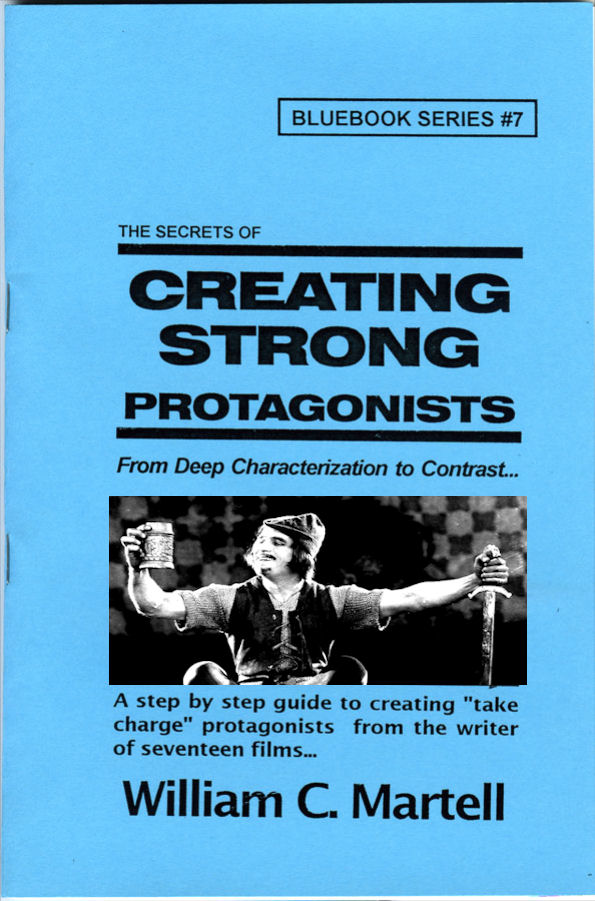
MOVIES ARE CHARACTERS!
*** CREATING STRONG PROTAGONISTS *** - For Kindle!
*** CREATING STRONG PROTAGONISTS *** - For Nook!
Expanded version with more ways to create interesting protagonists! A step-by-step guide to creating "take charge" protagonists. Screenplays are about characters in conflict... characters in emotional turmoil... Strong three dimensional protagonists who can find solutions to their problems in 110 pages. But how do you create characters like this? How do you turn words into flesh and blood? Character issues, Knowing Who Is The Boss, Tapping into YOUR fears, The Naked Character, Pulp Friction, Man With A Plan, Character Arcs, Avoiding Cliche People, Deep Characterization, Problem Protagonists, 12 Ways To Create Likable Protagonists (even if they are criminals), Active vs. Reactive, The Third Dimension In Character, Relationships, Ensemble Scripts, and much, much more. Print version is 48 pages, Kindle version is once again around 205 pages!
ONLY $4.99 - and no postage!
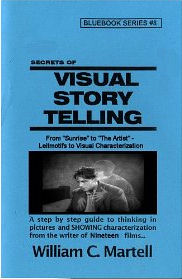
I WRITE PICTURES!
*** VISUAL STORYTELLING *** - For Kindle! (exclusive)
Show Don't Tell - but *how* do you do that? Here are techniques to tell stories visually! Using Oscar Winning Films and Oscar Nominated Films as our primary examples: from the first Best Picture Winner "Sunrise" (1927) to the Oscar Nominated "The Artist" (which takes place in 1927) with stops along the way Pixar's "Up" and Best Original Screenplay Winner "Breaking Away" (a small indie style drama - told visually) as well as "Witness" and other Oscar Winners as examples... plus RISE OF THE PLANET OF THE APES. Print version is 48 pages, Kindle version is over 200 pages!
ONLY $4.99 - and no postage!
DESCRIPTION & VOICE Blue Book!
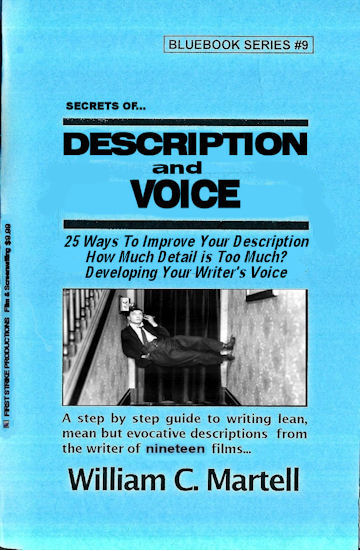
DESCRIPTION & VOICE Blue Book.
IS HALF OF YOUR STORY IN TROUBLE?
Most screenplays are about a 50/50 split between dialogue and description - which means your description is just as important as your dialogue. It just gets less press because the audience never sees it, the same reason why screenwriters get less press than movie stars. But your story will never get to the audience until readers and development executives read your script... so it is a very important factor. Until the movie is made the screenplay is the movie and must be just as exciting as the movie. So how do you make your screenplay exciting to read? Description is important in a novel as well, and the “audience” does read it... how do we write riveting description?
Only $4.99 and no postage!

PRO DIALOGUE TECHNIQUES!
*** DIALOGUE SECRETS *** - For Kindle!
***
Expanded version with more ways to create interesting dialogue! How to remove bad dialogue (and what *is* bad dialogue), First Hand Dialogue, Awful Exposition, Realism, 50 Professional Dialogue Techniques you can use *today*, Subtext, Subtitles, Humor, Sizzling Banter, *Anti-Dialogue*, Speeches, and more. Tools you can use to make your dialogue sizzle! Special sections that use dialogue examples from movies as diverse as "Bringing Up Baby", "Psycho", "Double Indemnity", "Notorious", the Oscar nominated "You Can Count On Me", "His Girl Friday", and many more! Print version is 48 pages, Kindle version is over 175 pages!
Only $4.99 - and no postage!

WHAT IS A SCENE?
*** SCENE SECRETS *** - For Kindle!
***
What is a scene and how many you will need? The difference between scenes and sluglines. Put your scenes on trial for their lives! Using "Jaws" we'll look at beats within a scene. Scene DNA. Creating set pieces and high concept scenes. A famous director talks about creating memorable scenes. 12 ways to create new scenes. Creating unexpected scenes. Use dramatic tension to supercharge your scenes. Plants and payoffs in scenes. Plus transitions and buttons and the all important "flow"... and more! Over 65,000 words! Print version was 48 pages, Kindle version is around 210 pages!
Only $4.99 - and no postage!
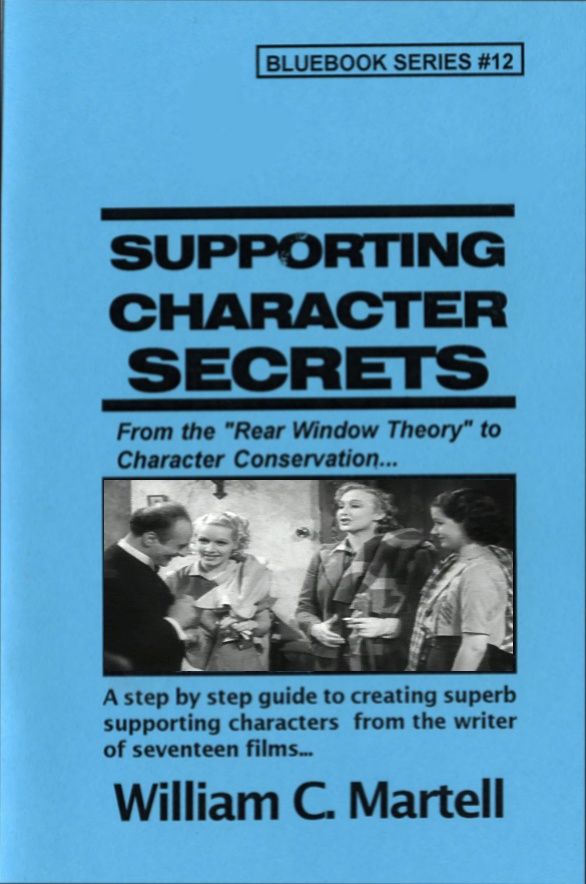
SUBPLOTS?
*** SUPPORTING CHARACTER SECRETS *** - For Kindle! (Exclusive)
Expanded version with more techniques to flesh out your Supporting Characters and make them individuals. Using the hit movie BRIDESMAIDS as well as other comedies like THE HANGOVER and TED and HIGH FIDELITY and
40 YEAR OLD VIRGIN and many other examples we look at ways to make your Supporting Characters come alive on the page.
Print version was 48 pages, Kindle version is around 170 pages!
ONLY $4.99 - and no postage!
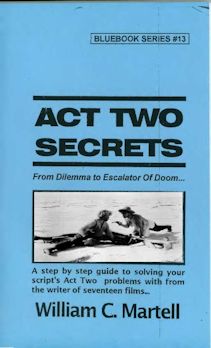
ACT TWO SOLUTIONS!
*** ACT TWO SECRETS *** - For Kindle!
Expanded version with more techniques to help you through the desert of Act Two! Subjects Include: What Is Act Two? Inside Moves, The 2 Ps: Purpose & Pacing, The 4Ds: Dilemma, Denial, Drama and Decision, Momentum, the Two Act Twos, Subplot Prisms, Deadlines, Drive, Levels Of Conflict, Escalation, When Act Two Begins and When Act Two Ends, Scene Order, Bite Sized Pieces, Common Act Two Issues, Plot Devices For Act Two, and dozens of others. Over 67,000 words (that’s well over 200 pages) of tools and techniques to get you through the desert of Act Two alive!
Print version was 48 pages, Kindle version is well over 200 pages!
ONLY $4.99 - and no postage!
BRAND NEW!!
All About Rewrites!
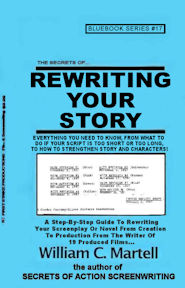
Rewriting In Waves?
*** REWRITES Blue Book! - For Kindle!
The end is just the beginning! You’ve finished your story, but now the rewriting begins! This 405 page book shows you how to rewrite your screenplay or novel to perfection. Everything from Character Consistency to Shoeboxing to How To Give And Receive Notes to 15 Solutions If Your Script’s Too Long! and 15 Solutions If Your Script’s Too Short! to Finding The Cause Of A Story Problem to Good Notes Vs. Bad Notes to Finding Beta Readers to Avoiding Predictability to Learning To Be Objective About Your Work to Script Killer Notes and Notes From Idiots to Production Rewrites and What The Page Colors Mean? and a Complete Rewrite Checklist! The complete book on Rewriting Your Story!
ONLY $4.99 - and no postage!
All About Endings!
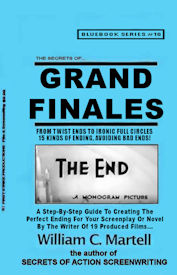
GRAND FINALES Blue Book!
The Perfect Ending For Your Story!
The First Ten Pages Of Your Screenplay Are Critical,
But What About The Last 10 Pages?
Creating the perfect ending to your story! This 100,000 word book shows you how to end your story with a bang, rather than a whimper. Everything from Resolution Order to Act Three Tools to Happy or Sad Endings? to How The Beginning Of Your Story Has Clues To The Ending (in case you were having trouble figuring out how the story should end) to Falling Action to How To Avoid Bad Endings to Writing The Perfect Twist Ending to Setting Up Sequels & Series to Emotional Resolutions to How To Write Post Credit Sequences to Avoiding Deus Ex Machinas, to 20 Different Types Of Ends (and how to write them) and much more! Everything about endings for your screenplay or novel!
Only: $4.99
NO KINDLE REQUIRED! Get the *free* app (any device, except your Mr. Coffee) on the order page on Amazon!
All About LOGLINES, TREATMENTS, and PITCHING!
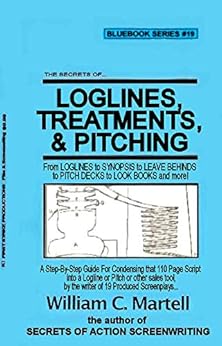
LOGLINES, TREATMENTS, and PITCHING! Blue Book!
Distilling Your Screenplay!
Loglines, Treatments, Pitching, Look Books, Pitch Decks, One Pagers, Rip-O-Matics?
You have written a brilliant 110 page screenplay, but how do you get anyone to read it? You need to distill it down into some form of verbal moonshine or story rocket fuel that will ignite that bored development executive or manager or agent and get them to request your screenplay. But how do you shrink those 110 pages into a 25 word logline or a 2 minute elevator pitch or a one page synopsis or a short paragraph? This 100,000 word book shows you how! Everything you need to know! From common logline mistakes (and how to solve them) to how your pitch can reveal story problems to the 4 types of pitches!
272 Pages - ONLY $4.99!
READY TO BREAK IN?
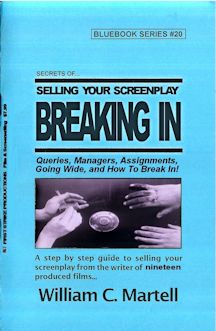
THE BUISINESS SIDE
*** BREAKING IN BLUE BOOK *** - For Kindle!
Should really be called the BUSINESS BLUE BOOK because it covers almost everything you will need to
know for your screenwriting career: from thinking like a producer and learning to speak their language,
to query letters and finding a manager or agent, to making connections (at home and in Hollywood) and
networking, to the different kinds of meetings you are will have at Studios, to the difference between
a producer and a studio, to landing an assignment at that meeting and what is required of you when you
are working under contract, to contracts and options and lawyers and... when to run from a deal!
Information you can use *now* to move your career forward! It's all here in the Biggest Blue Book yet!
Print version was 48 pages, Kindle version is over 400 pages!
$4.99 - and no postage!

Movie Magic Screenwriter is the best selling screenplay formatting software and the choice of Hollywood professionals. Screenwriter automatically formats while you write so you can focus on what you're writing, not where it goes on the page. It also formats for television, stage, novels and comic book scripts so you've got an all in one package for any story you want to write. Academy Award Tech Winner!
* * * Buy It!

|
|
|
|
|
E BOOKS PAGE
|
|
 E BOOKS: New Blue Books and Novelettes!
E BOOKS: New Blue Books and Novelettes!
I am expanding all of the Blue Books from around 44 pages of
text to around 200 pages! Some are over 250 pages! See what is availabale and what is coming soon!Also, I've been writing Novelletes and there
will soon be novels.
E BOOKS: BLUE BOOKS & NOVELLETES
|
|
ONLINE CLASSES
|
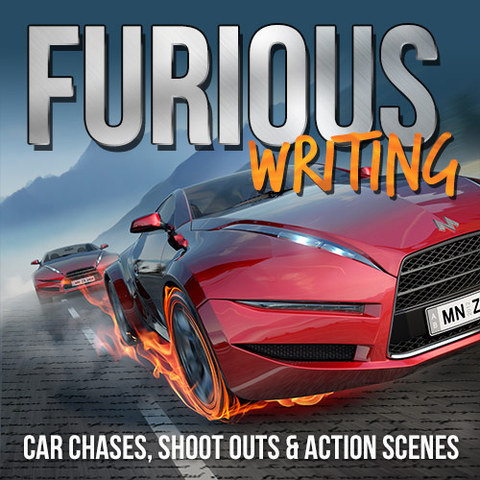
|
|
MY OTHER SITES
|
|
B MOVIE WORLD
Cult Films, Exploitation, Bikers & Women In Prison, Monster Movies.
FIRST STRIKE PRODUCTIONS
Producing my own scripts, investment possibilities, pipe dreams.
|
|
NAKED SCREENWRITING CDs
|
|
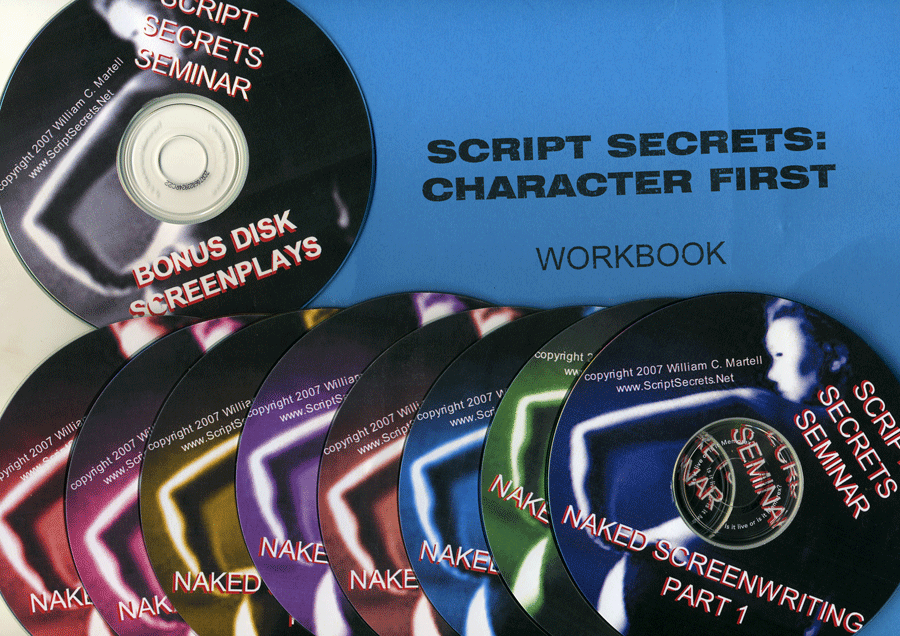 The NAKED SCREENWRITING CLASS ON CD!
The 2001 London Class on 8 CDs! Recorded *live* the morning after the Raindance Film Festival
wrapped. The two day class on 8CDs, plus a workbook, plus a bonus CD with PDFs.
The NAKED SCREENWRITING CLASS ON CD!
The 2001 London Class on 8 CDs! Recorded *live* the morning after the Raindance Film Festival
wrapped. The two day class on 8CDs, plus a workbook, plus a bonus CD with PDFs.
The 2 Day Class on CD!
|
|
BOOKSTORE
|
|
Every screenwriting book in the world!
SCREENWRITER'S BOOKSTORE
In Association With Amazon.com
From the latest screenwriting book to
guides for finding agents and producers... all with at the
Amazon.com discount!
|
|
BOOKLETS & PRODUCTS
|
|
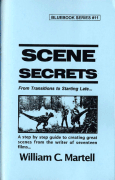 FIRST STRIKE BLUE BOOKS
FIRST STRIKE BLUE BOOKS
Each Blue Book is 48
pages and focuses on a different aspect of screenwriting. Dialogue. Visual Storytelling. Your First Ten Pages. Act 2 Booster. Protagonists. Great Endings.
Seventeen Blue Books now available!
THE SECRETS OF ACTION SCREENWRITING The Best Nuts & Bolts Screenwriting Book On The
Market!
|
|
BILL'S CORNER
|
|
My
nineteen produced films, interviews with me in magazines,
several sample scripts, my available scripts list... And MORE!
...............................BILL'S CORNER
Available Scripts
|
|
CLASSES ON CD
|
|
 CLASSES ON CD! Take a class on CD! GUERRILLA MARKETING - NO AGENT? NO PROBLEM! and WRITING THRILLERS (2 CDs). Full length classes on CD. Now Available: IDEAS & CREATIVITY, WRITING HORROR, WRITING INDIE FILMS, more!
CLASSES ON CD! Take a class on CD! GUERRILLA MARKETING - NO AGENT? NO PROBLEM! and WRITING THRILLERS (2 CDs). Full length classes on CD. Now Available: IDEAS & CREATIVITY, WRITING HORROR, WRITING INDIE FILMS, more!
Take classes on CD!
|
|
|
|
|

